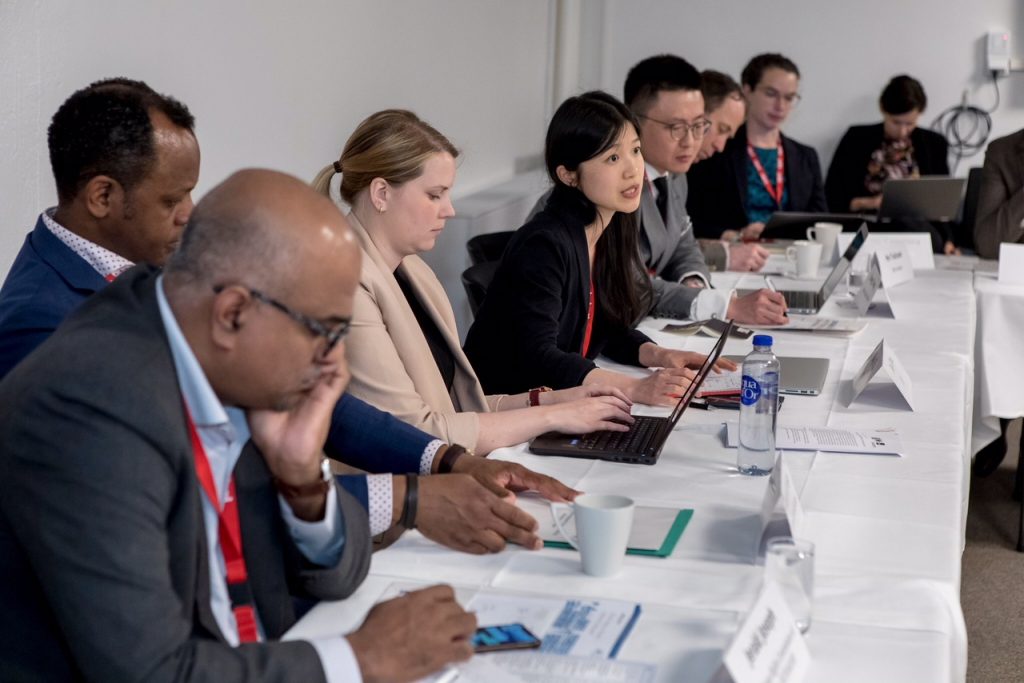Stockholm International Peace Research Institute (SIPRI) hosted the 2019 Stockholm Forum on Peace and Development with the theme: ‘From crisis response to peacebuilding: Achieving synergies’, from 14th to 16th May.

China’s rising role in sustainable development and peacebuilding contexts
Jiayi Zhou moderated this session which explored China’s growing economic and political footprint in fragile and developing country contexts, including but not limited to situations of protracted conflict. Since the early 2000s, China has become an increasingly significant development actor and source of foreign direct investment, operating alongside and parallel to traditional donors and institutions associated with the Global North. In the past decade, China has also increased its profile and contribution to peacekeeping operations and conflict mediation, and it has even begun to engage in peacebuilding. China’s emergence as a donor, financier, and political and security actor warrants an updated understanding of the developmental and geopolitical landscape. How are China’s modalities of aid and investment, perspectives on security–development linkages, and relations with political actors—including civil society—affecting outcomes related to peace, security and sustainable development in the Global South? Are there implications for achievement of the Sustainable Development Goals (SDGs), including those related to the environment? Are local actors and traditional donors engaging with China?
Focus and objectives
The session explored three guiding questions. Over the past decade or longer, what shifts have been observed in the role of Chinese actors in the various domains of expertise, and what predictions can be made regarding the future of China’s role in such contexts? Does China’s increasing involvement in these domains complement or contrast with traditional donors and actors from the Global North, and to local actors’ (governmental, civil society) ideas regarding how to sustainably achieve development or peace? How does this influence the local, national and geopolitical landscape for achievement of the SDGs?
Key takeaways
China’s ability to act as a positive contributor or impetus for more sustainable outcomes in developing country contexts depends on local partners as well as on China’s own modalities of acting. In certain country contexts, China has been a catalyst for greater attention to national development, and it has helped stakeholders shift from security-centred to growth-centred models or paradigms. In others, China has fed into systems of corruption and low institutional capacity, and results have not been seen as people-centred but rather as inefficient projects that contribute to an asymmetric relationship between China and the counterpart.
China’s tools, instruments and modalities of operating are similar to those of traditional development actors in certain aspects, but also differ. There is growing recognition that China needs to update its way of operating and bring it into line with Western standards (e.g. the Development Assistance Committee (DAC) of the Organisation for Economic Co-operation and Development (OECD)). In addition, there needs to be more coordination with traditional donor communities, and more engagement with local actors and stakeholders outside of simply ‘the (local) government’. In this regard, China has in several regards followed the footsteps of previous or traditional development actors and funders, including West states, Japan and South Korea, and committed the same kinds of mistakes (e.g. tied aid, low transparency, scandals). These must be addressed if China is to be perceived and act as a legitimate and genuine contributor to sustainable development.
On peacebuilding, China has increasingly expanded its overseas security footprint. While this is mostly tied to its growing economic interests abroad, there are cases where economic relationships follow strategic interests. In general, China is not socialized into thinking about ‘peacebuilding’ in the conventional (traditional developmental community) sense of the term, but it works through its own model; for example, quiet diplomacy and economic development as the basis of peace. It is learning, including through its participation in peacekeeping operations. On environmental questions, China has labelled its flagship Belt and Road Initiative as ‘green’. But the lock-in effects of its previous and continuing ‘brown’ investments (e.g. coal-fired power plants) is concerning.
China has said many times that its ‘model’ of development is not exportable; however, many developing countries have increasingly looked to the Chinese experience of poverty alleviation. In conjunction now with the sheer amounts of assistance that China is able to provide, a new alternative to traditional or Western developmental models and assistance is clearly emerging. There continue to be strong concerns over how this will benefit the SDGs and climate goals, including issues of transparency, civil society engagement, corruption, strategic motivations and geopolitical problems. However, many are hopeful, and suggest that there is no getting around a more inclusive global framework for achieving the SDGs and sustainable outcomes without China or Chinese resources.
This session report was produced onsite at the 2019 Stockholm Forum on Peace and Development hosted by SIPRI and the Swedish Ministry for Foreign Affairs. The report aims to reflect the session discussion. The views, information or opinions expressed do not necessarily represent those of SIPRI, the Swedish Ministry for Foreign Affairs or other institutes associated with the session.
Written by: Jiayi Zhou



